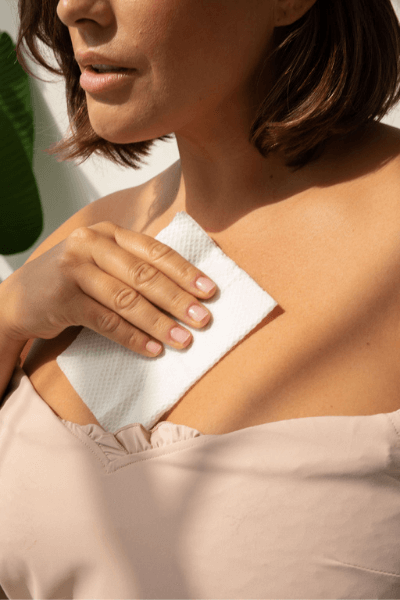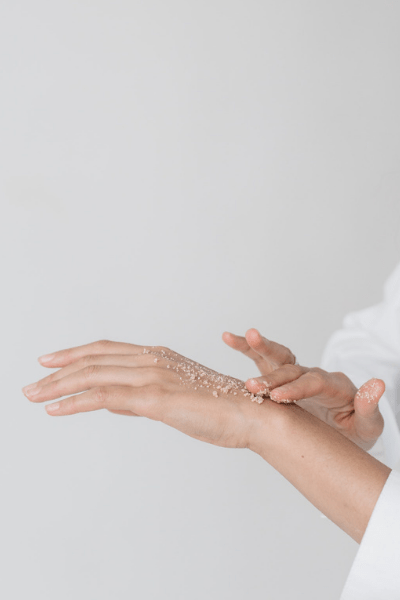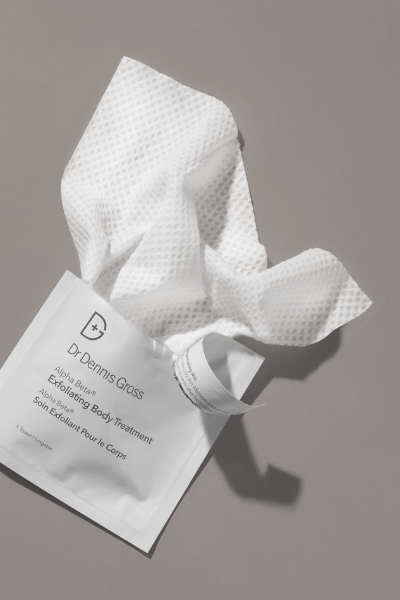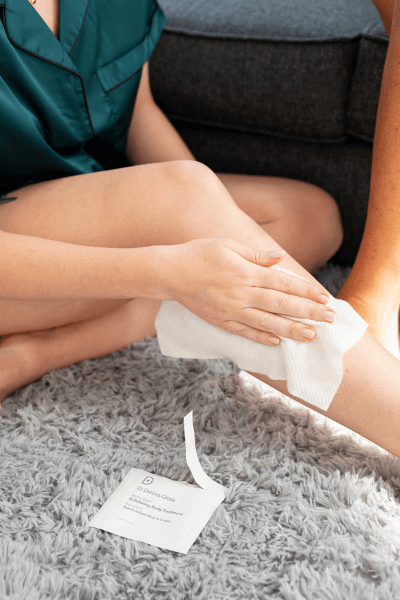Whenever we think about exfoliation, it almost always pertains to facial exfoliation. But we say we should be exfoliating our entire body too. The skin is the largest organ on our body since it covers around two meters of surface area, so it’s only fitting that we give it some TLC, right?
Before you bust out the body scrubs, we need to discuss the hows and whys of body exfoliation. We had a quick chat with dermatologist Dr. Dennis Gross, the man behind the award-winning Alpha Beta Universal Daily Peels, about proper body exfoliation for smoother skin from head-to-toe.
Why and how you should exfoliate from the neck down

Chemical exfoliation is not just for your face but your body as well. (Photo courtesy of Dr. Dennis Gross Skincare)
Dr. Gross said exfoliating can solve your body skin problems by “hydrating crepey skin, diminishing ingrown hairs and keratosis pilaris (dry rough skin patches), clearing up body blemishes and evening out patchy skin tone”.
“The body skin and face skin are more similar than you’d think,” Dr. Gross explained. “In the same way that chemical exfoliation addresses uneven texture, clogged pore and dullness on your face, it also has the same benefits for your body.”
But that doesn’t mean you can use your facial exfoliator on your elbows and knees. Dr. Gross said that the rest of the body has skin that’s two to three times thicker than that on your face. This means you need to use a product that “should have higher concentrations of ingredients” for maximum effectiveness. You can also exfoliate the body more frequently, up to two to three times a week.
Physical vs. chemical exfoliants

Should you use physical, chemical, or both for body exfoliation? (Photo from: Pavel Danilyuk via Pexels)
There’s a lot of debate surrounding exfoliation, specifically on whether you should use physical or chemical exfoliants. Physical exfoliants are products that have tiny granules, like ground grains, that are gently buffed into the skin to remove the top layer of dead skin cells. Chemical exfoliants, on the other hand, include acids (AHAs and BHAs) and certain types of enzymes that break the chemical bonds in dead skin cells that make it easier to wash these away.
Physical exfoliants that are not finely milled have been found to cause microtears in the skin, especially when used too hard or too often, making it easier for bacteria and dirt to invade the skin and cause trouble for you. “Think of physical exfoliation like sandpaper on wood — it doesn’t give you an even exfoliation,” he said. Not all physical exfoliants are bad, though! You can still definitely use one as long as you’re careful not to be too enthusiastic using it.
Meanwhile, chemical exfoliants can leave a more even exfoliation as well as additional benefits. “For example, glycolic acid is a chemical exfoliator, but it also stimulates your skin’s production of collagen and helps to clear pores,” he added.
Chemical exfoliators you can look for
Bakuchiol is one. It’s a natural alternative to retinol and has the additional benefit of stimulating collagen production. It’s a personal favourite of Dr. Gross for body exfoliation because “it also has anti-inflammatory properties”. Skin inflammation — which can appear as dark spots and redness, acne breakouts, and itchiness — needs skin-soothing agents like bakuchiol and other plant-based oils to get better.

Dr. Dennis Gross Alpha Beta Exfoliating Body Treatment Towel, SGD90/~USD67.76 (Photo courtesy of Dr. Dennis Gross Skincare)
Bromelain is another chemical exfoliator that’s good for the body. It’s an enzyme typically extracted from pineapple stems that “digests dead skin cells” and leaves the skin feeling super smooth. Pineapple enzymes are essentially “eating you” because they naturally break down the proteins in your body. This and bakuchiol are found in the new Dr. Dennis Gross Alpha Beta Exfoliating Body Treatment, which comes in towel-form for exfoliating your body with ease.
A word of caution when doing chemical exfoliation for the body: Check the concentration of the acids. A high concentration of a single acid “can be too intense and throw the skin off balance” and can lead to other skin issues, especially if you already have dry or sensitive skin, according to Dr. Gross. If you have body acne, Dr. Gross advises you to stay away from benzoyl peroxide since “there are much better, non-irritating ingredient alternatives for acne”.
Extra body exfoliation tips

Take your time when doing chemical exfoliation for the body — you have a lot of surface area to cover! (Photo courtesy of Dr. Dennis Gross Skincare)
If you’re going to exfoliate your body, make sure you have a mirror handy. This will help you target hard-to-reach areas like your back. You must also focus on the body parts that tend to darken more, like your elbows, knees, and underarms; the discoloured skin in these areas are usually caused by a build-up of dead skin cells and excessive friction from your clothes.
Similar to facial exfoliation, you must always follow body exfoliation with a moisturiser or body lotion. It also helps to use a chemical body exfoliator that already has hydrators like hyaluronic acid and squalene.
In addition to that, Dr. Gross advises against exfoliating on “broken skin” because doing so can worsen the problem. Doing it immediately after “using self-tanner” is also a no-no since it will end up looking patchy. He also recommends exfoliating on clean, dry skin for better results.
If you keep these little tips and tricks in mind, body exfoliation will be an easy task that will give greater rewards than you’d expect.
(Cover photo courtesy of Dr. Dennis Gross Skincare)
For more similar skincare tips, head over here.
Comments, questions or feedback? Email us at [email protected].



